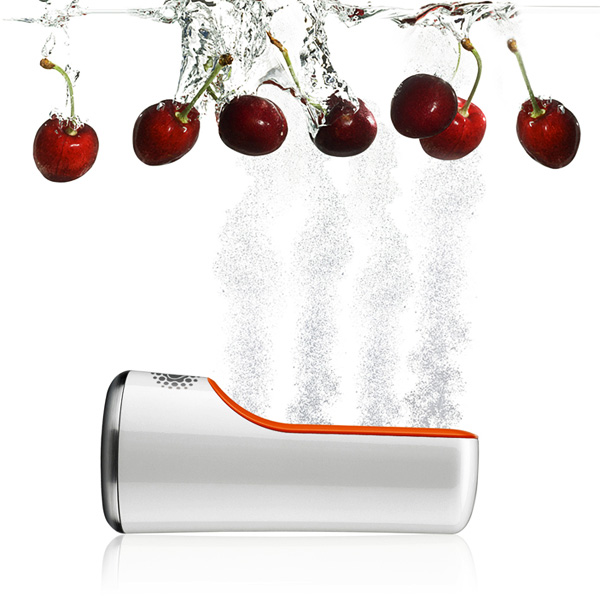The other day I went to pick up some dishwashing detergent when I noticed they were selling food detergents now. I’ve always just used water to rinse off my foods but sometimes you need something harsher. The WOW Water Sterilizer uses electrolysis to eliminate harmful bacteria in everything from fruits, veggies, kitchen appliances as well as baby bottles and chew toys – all without chemical detergents.
Do you know where your potatoes, oranges and tomatoes have been? Unless your fruits and vegetables are organic, they grew up in fields covered in pesticides and herbicides. Although the pesticide residues on fruits and vegetables are considered to be at safe levels for human consumption, do you really want those extra chemicals on your food?
Once your fruits and vegetables were ready for harvest, they were handled by several different pairs of hands in the fields and orchards, then in the warehouses, and finally again in your grocery store. Bacteria such as Listeria, Salmonella and E. Coli may all be lurking on your fruits and vegetables, whether they are organically grown or conventionally grown. These bacteria all cause food-borne illness and need to be washed away from your produce.
You need to get those fresh fruits and vegetables in your diet, but not the insects, chemicals and bacteria that come along with them so make sure you wash your fruits and vegetables before you eat them.
- Start by keeping your kitchen countertops, refrigerator, cookware and cutlery clean.
- Always wash your hands before preparing meals and handling fruits and vegetables.
- Keep fresh greens, fruits and vegetables away from uncooked meats to avoid cross-contamination.
- Choose healthy looking, ripe fruits and vegetables when you shop. Avoid bruised, moldy and mushy produce.
- Wait until just before you eat or prepare your fruits and vegetables to wash them. Fruits and vegetables have natural coatings that keep moisture inside, and washing them will make them spoil sooner.
- Wash all pre-packaged fruits and vegetables, even if the label claims they are pre-washed.
- Wash all parts of your fruits and vegetables, even if you don't plan on eating them. Bacteria can live on the rind of an orange or the skin of a cucumber, for example. Though you may peel them away and toss them in the trash, the bacteria can be transferred from the outside of the fruit or vegetable to the knife you use to cut them, and then onto the parts you will be eating.
- Gently rub fruits and vegetables under running water. Don't use any soaps, detergents, bleaches or other toxic cleaning chemicals. These chemicals will leave a residue of their own on your produce.
- Commercial sprays and washes sold for cleaning vegetables really aren't any better than cleaning thoroughly with plain water, so don't waste your money on them.
- Firmer fruits and vegetables, such as apples and potatoes, can be scrubbed with a vegetable brush while rinsing with clean water to remove dirt and residues.
- Remove and discard the outer leaves of lettuce and cabbage heads, and thoroughly rinse the rest of the leaves.
- Rinse berries and other small fruits thoroughly and allow them to drain in a colander.




0 comments:
Post a Comment